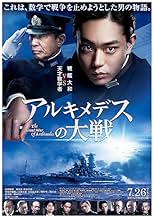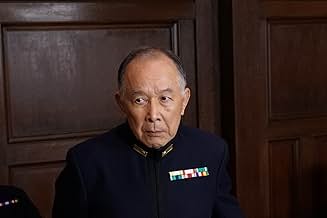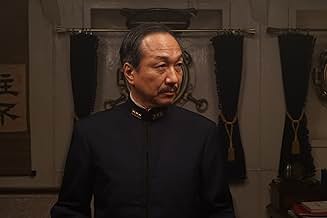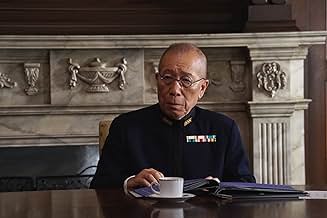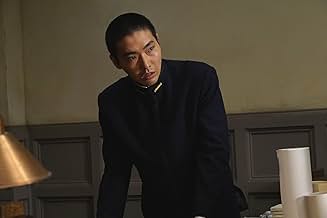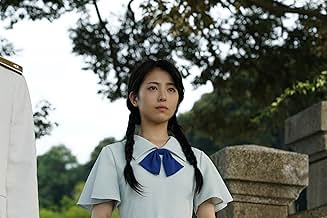Arukimedesu no taisen
- 2019
- 2 घं 10 मि
IMDb रेटिंग
6.7/10
1.3 हज़ार
आपकी रेटिंग
अपनी भाषा में प्लॉट जोड़ेंIn 1933, a young naval officer and math prodigy uncovers a conspiracy regarding the construction of Japanese warships for the ongoing World War 2.In 1933, a young naval officer and math prodigy uncovers a conspiracy regarding the construction of Japanese warships for the ongoing World War 2.In 1933, a young naval officer and math prodigy uncovers a conspiracy regarding the construction of Japanese warships for the ongoing World War 2.
- पुरस्कार
- 4 कुल नामांकन
T.J. Anthony
- Osami Nagano
- (English version)
- (वॉइस)
Luis Bermudez
- Mr. Osato
- (English version)
- (वॉइस)
Jacob Eiseman
- Various Soldiers and Walla
- (English version)
- (वॉइस)
Alex Hom
- Shojiro Tanaka
- (English version)
- (वॉइस)
Chase Kloza
- Additional voices
- (English version)
- (वॉइस)
Lizzy Laurenti
- Walla
- (वॉइस)
Nicholas Markgraf
- Additional Voices
- (English version)
- (वॉइस)
- …
फ़ीचर्ड समीक्षाएं
First it must be stated that this in no way is a 'war movie' as most think of it. The only direct depiction of battle occurs in the beginning of the movie, and as others have said requires some background knowledge of the actual history to grasp what is being depicted. However, I found it striking (and others without the historical knowledge can do likewise) to think back on this scene after the architect describes the ship's purpose later in the movie. I have no idea how accurate the movie is in depicting the actual sentiment's of the architect, but regardless it struck me and made me rethink how I viewed the construction of the ship in question.
At this point it must also be said that the dubbing of the movie does it no favors (besides not requiring a fluency in Japanese to view). The dubbed voices of all figures accept Yamamoto seemed to me to often not reflect the sentiments of the action depicted, which does detract from the viewing experience. However, they do serve to make the movie understandable for non-Japanese speakers such as myself, and for that at least I am grateful. I'm not sure if it is possible to watch the movie in Japanese but simply with English subtitles, but it is something to look into if you find the dubbing too jarring to watch the movie otherwise.
Returning to the rest of the movie, it follows the discussion of how the Imperial Japanese Navy (IJN) planned to expand during the 1930s, when war with the world was not yet actuality, but could be seen on the horizon. It therefore closely examines (with a background of the internal politics of the Japanese armed forces) the debate over two potential paths of expansion, and the costs behind each one. Cue the wiz-kid with a knack for numbers, called in to question the expected costs of one of the plans. And here is where the viewer intent on a stereotypical war movie will lose interest; but for those who continue watching, they will likely leave with a much greater appreciation for all of the abstract mathematical concepts they suffered through in school (I know I for one left seeing much better the usefulness of optimization and regression than when I began). This is a war movie that considers the intellectual backing of the effort, whether that be calculations, counterintelligence, or even how to effectively utilize (or counter if need be) the underpinnings of a nation at war; and that is not something with a terribly large audience of interest. But for those interested in such things, I found the movie a terrific watch.
At this point it must also be said that the dubbing of the movie does it no favors (besides not requiring a fluency in Japanese to view). The dubbed voices of all figures accept Yamamoto seemed to me to often not reflect the sentiments of the action depicted, which does detract from the viewing experience. However, they do serve to make the movie understandable for non-Japanese speakers such as myself, and for that at least I am grateful. I'm not sure if it is possible to watch the movie in Japanese but simply with English subtitles, but it is something to look into if you find the dubbing too jarring to watch the movie otherwise.
Returning to the rest of the movie, it follows the discussion of how the Imperial Japanese Navy (IJN) planned to expand during the 1930s, when war with the world was not yet actuality, but could be seen on the horizon. It therefore closely examines (with a background of the internal politics of the Japanese armed forces) the debate over two potential paths of expansion, and the costs behind each one. Cue the wiz-kid with a knack for numbers, called in to question the expected costs of one of the plans. And here is where the viewer intent on a stereotypical war movie will lose interest; but for those who continue watching, they will likely leave with a much greater appreciation for all of the abstract mathematical concepts they suffered through in school (I know I for one left seeing much better the usefulness of optimization and regression than when I began). This is a war movie that considers the intellectual backing of the effort, whether that be calculations, counterintelligence, or even how to effectively utilize (or counter if need be) the underpinnings of a nation at war; and that is not something with a terribly large audience of interest. But for those interested in such things, I found the movie a terrific watch.
This movie is an insight into modern Japanese thought and modern Japanese propaganda. It contains ideas and explications about the war of the 1930s and 1940s that put a better face on those disasters, at least for the Japanese viewer. But it does so with a minimum of distortion of the facts, showing respect for a highly literate society. It shows a sophistication that is far above the propaganda that is daily fed to American society.
The blame for getting the country into its impossible situation is deftly removed from the governing personalities of the time and, predictably, the emperor is never mentioned in this war film. It is imperative in Japanese culture that no blame be attributed to him, not even an implicit guilt that could be inferred from its denial.
Mention is made of the mood of the country and the indomitable attitude of the Japanese population, buoyed up as it was at the time by an broken series of successes on the Asian mainland. A grand admiral of the imperial navy grimly allows that the public's enthusiasm cannot be inhibited and that it would inexorably lead to war against the western powers. He points out that Japan is already heavily invested in a war in China. These circumstances, combined with the world's reaction to the aggression in Asia, and Japan's withdrawal from the League of Nations, will force war on the Japanese whether they want it or not.
As an aside, Grand Admiral Yamamoto is credited/blamed for originating the idea of destroying the American fleet at Pearl Harbor.
The story line bases on a plot to sell a plan the government on a plan to build the world's biggest battleship, the Yamato, (a real ship which in fact was built by Japan in the 1930s). There is suspense over the amount of funding this will require and competition for the budget from a faction that wants to build aircraft carriers instead. There is no mention of the violation of treaties in building the over-sized ship.
Enter a handsome, brilliant, young man who will unravel all the plotting with some surprising plot twists along with a slight romantic interest with the daughter of a conniving industrialist. He, Tadashi Kai, (superbly acted by Suda Masaki*) is the vehicle that carries us through the story. He also symbolizes the rebel who takes on the establishment and prevails with his fresh, independent insights. Yet, ingeniously, the establishment itself comes through it without serious damage.
The high-ranking Japanese naval officers are depicted with great dignity and ability, though less honesty, throughout the movie. The story reassures the Japanese audience that Japan's motives in the war were honorable and the disasters largely pressed on the country by outside or otherwise overwhelming forces. Other than that it's a very watchable movie, well done with good acting and a very well written story. There are numerous reasons to watch this excellent movie; I hope I have touched upon the more salient of these.
* These Japanese names are in the Asian order, given name following the family name.
The blame for getting the country into its impossible situation is deftly removed from the governing personalities of the time and, predictably, the emperor is never mentioned in this war film. It is imperative in Japanese culture that no blame be attributed to him, not even an implicit guilt that could be inferred from its denial.
Mention is made of the mood of the country and the indomitable attitude of the Japanese population, buoyed up as it was at the time by an broken series of successes on the Asian mainland. A grand admiral of the imperial navy grimly allows that the public's enthusiasm cannot be inhibited and that it would inexorably lead to war against the western powers. He points out that Japan is already heavily invested in a war in China. These circumstances, combined with the world's reaction to the aggression in Asia, and Japan's withdrawal from the League of Nations, will force war on the Japanese whether they want it or not.
As an aside, Grand Admiral Yamamoto is credited/blamed for originating the idea of destroying the American fleet at Pearl Harbor.
The story line bases on a plot to sell a plan the government on a plan to build the world's biggest battleship, the Yamato, (a real ship which in fact was built by Japan in the 1930s). There is suspense over the amount of funding this will require and competition for the budget from a faction that wants to build aircraft carriers instead. There is no mention of the violation of treaties in building the over-sized ship.
Enter a handsome, brilliant, young man who will unravel all the plotting with some surprising plot twists along with a slight romantic interest with the daughter of a conniving industrialist. He, Tadashi Kai, (superbly acted by Suda Masaki*) is the vehicle that carries us through the story. He also symbolizes the rebel who takes on the establishment and prevails with his fresh, independent insights. Yet, ingeniously, the establishment itself comes through it without serious damage.
The high-ranking Japanese naval officers are depicted with great dignity and ability, though less honesty, throughout the movie. The story reassures the Japanese audience that Japan's motives in the war were honorable and the disasters largely pressed on the country by outside or otherwise overwhelming forces. Other than that it's a very watchable movie, well done with good acting and a very well written story. There are numerous reasons to watch this excellent movie; I hope I have touched upon the more salient of these.
* These Japanese names are in the Asian order, given name following the family name.
I found this movie to have an interesting mix of historical and fiction in the events portrayed. The CGI used in some sections is fairly good, but could have been better, which I assume is related to the production budget. The acting seems to be somewhat exaggerated in gesture and vocalization. There are some technical faults in the battle scene and in the sinking of the ship, but they do not detract from the imagery - only a 'purist' would point them out. The English dubbing takes some getting used to from the synchronicity of the face and words. Listening in Japanese and having English subtitles is easier to watch.
Great Japanese film about the pre-war corruption, code of honor and nationalistic pride that led to Japan's complete destruction. So many in the high command knew a war with America was unwinnable but militaristic pride and honor to the Emperor ruled their decisions.
Largest Battleship ever built used for nothing more than a Kamikaze Raid that took 3000 sailors.
Not an action film (apart from the sinking), but a Japanese snapshot of ne part of mindset that led to war.
Best watched in the original Japanese with subtitles.
*oh, actor who portrayed Admiral Nagumo in Midway plays Admiral Nagano here.*
Largest Battleship ever built used for nothing more than a Kamikaze Raid that took 3000 sailors.
Not an action film (apart from the sinking), but a Japanese snapshot of ne part of mindset that led to war.
Best watched in the original Japanese with subtitles.
*oh, actor who portrayed Admiral Nagumo in Midway plays Admiral Nagano here.*
I watched the Japanese language version of this movie last night and was impressed with the Japanese cast and their performances. I was unaware that an English dub existed until doing a little research today.
After watching the English dub, I was impressed by all of the English dub actors except for one. The most important one. I'm referring to the lead role of Tadashi Kai originally (well) played by Masaki Suda. Suda's performance was both impressive and expressed the realism that should be expected of a lead actor.
However: The English voice actor chosen to portray the character of Tadashi Kai did a huge disservice to the entire tone of the role. While I will give "Derick Snow" exceptionally high marks for his many performances as a dub actor in the wonderful world of Japanese Anime, his portrayal of "Lt. Commander Tadashi Kai was both childish and demeaning. Snow made the lead actor in this movie sound like a pansy. It was actually quite embarrassing. One can only hope that Masaki Suda never hears how he was portrayed by an American actor.
You may say that this is one man's opinion, and you would be correct. However I have made my living using my own voice in the broadcast media industry for more years that I care to count these days. Hate me if you will, but I stand by my words.
Just another voice in the crowd :)
After watching the English dub, I was impressed by all of the English dub actors except for one. The most important one. I'm referring to the lead role of Tadashi Kai originally (well) played by Masaki Suda. Suda's performance was both impressive and expressed the realism that should be expected of a lead actor.
However: The English voice actor chosen to portray the character of Tadashi Kai did a huge disservice to the entire tone of the role. While I will give "Derick Snow" exceptionally high marks for his many performances as a dub actor in the wonderful world of Japanese Anime, his portrayal of "Lt. Commander Tadashi Kai was both childish and demeaning. Snow made the lead actor in this movie sound like a pansy. It was actually quite embarrassing. One can only hope that Masaki Suda never hears how he was portrayed by an American actor.
You may say that this is one man's opinion, and you would be correct. However I have made my living using my own voice in the broadcast media industry for more years that I care to count these days. Hate me if you will, but I stand by my words.
Just another voice in the crowd :)
क्या आपको पता है
- ट्रिवियाAt about 5:30, the ammunition magazines on the battleship Yamato explode, after which the capsized (inverted) bow of the Yamato rises up from the water into a vertical position before sinking. This mirrors the manner in which the future Space Battleship Yamato is destroyed in Uchû senkan Yamato: Kanketsuhen (1983), which itself was later recreated in the reboot series The Trap on All Sides (2012) (albeit her "destruction" in this case only being a ruse to deceive the enemy).
टॉप पसंद
रेटिंग देने के लिए साइन-इन करें और वैयक्तिकृत सुझावों के लिए वॉचलिस्ट करें
- How long is The Great War of Archimedes?Alexa द्वारा संचालित
विवरण
- रिलीज़ की तारीख़
- कंट्री ऑफ़ ओरिजिन
- आधिकारिक साइटें
- भाषा
- इस रूप में भी जाना जाता है
- The Great War of Archimedes
- उत्पादन कंपनियां
- IMDbPro पर और कंपनी क्रेडिट देखें
बॉक्स ऑफ़िस
- दुनिया भर में सकल
- $1,64,54,674
- चलने की अवधि2 घंटे 10 मिनट
- रंग
इस पेज में योगदान दें
किसी बदलाव का सुझाव दें या अनुपलब्ध कॉन्टेंट जोड़ें


![Trailer [OV] देखें](https://m.media-amazon.com/images/M/MV5BZmVlZWNmMmMtYmUxMy00MGQ5LWIyMTMtYTRlY2E1M2M0OWNkXkEyXkFqcGdeQXRyYW5zY29kZS13b3JrZmxvdw@@._V1_QL75_UX500_CR0)
